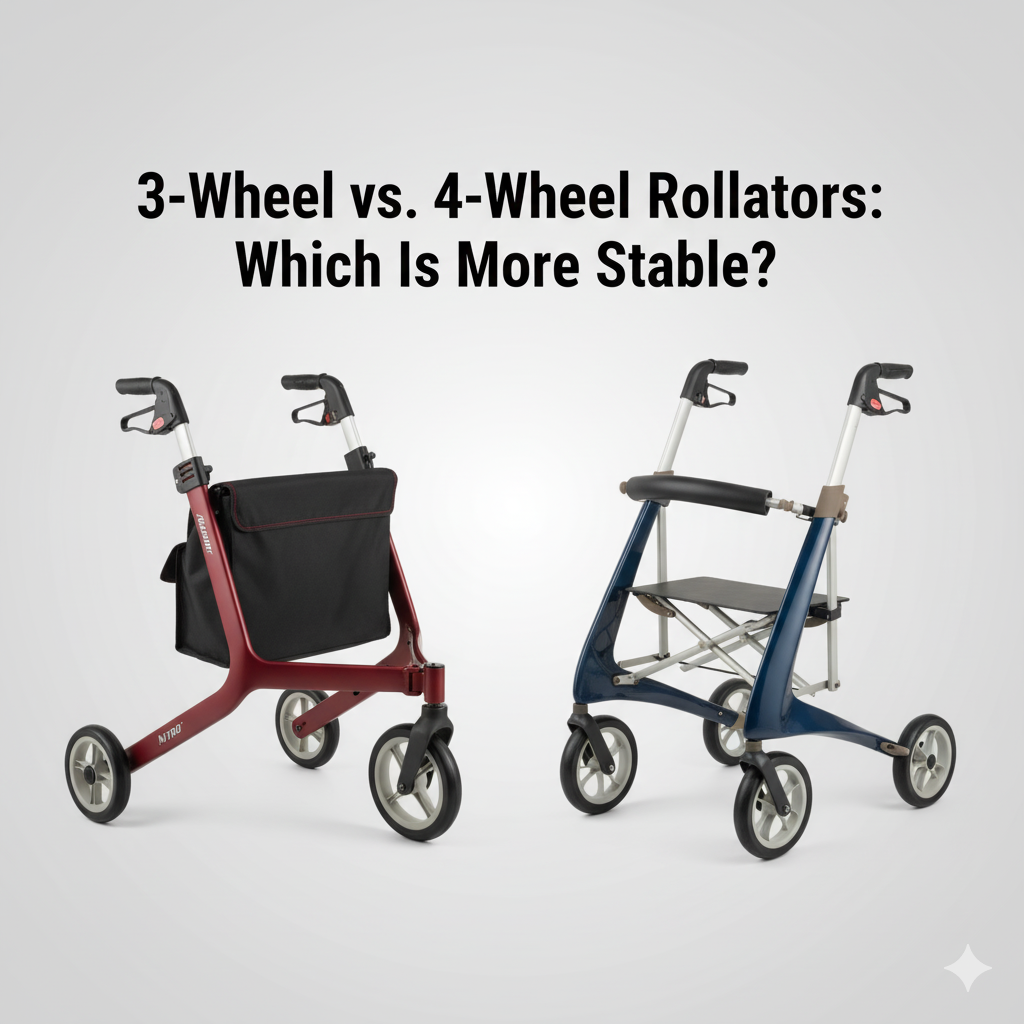Choosing the right rollator can transform daily life and mobility – but are 3-wheel or 4-wheel rollators the safer, more stable choice for seniors?
Below, we answer your most common questions using real user experiences and expert recommendations.
What is a Rollator, and Why Does Stability Matter?
A rollator is a walker with wheels, designed to provide balance, support, and independence to users who need help walking. Stability is critical: it reduces the risk of falls and boosts confidence for seniors at home or on the go.
Key Differences: 3-Wheel vs. 4-Wheel Rollators
| Feature | 3-Wheel Rollator | 4-Wheel Rollator |
|---|---|---|
| Number of Wheels | 3 (triangular layout) | 4 (rectangular layout) |
| Turning Radius | Excellent for tight spaces | Good, slightly wider |
| Stability | Less stable, can tip on uneven terrain | Highly stable, less likely to tip |
| Seat Option | Usually none | Built-in seat and backrest |
| Weight | Lighter, more portable | Heavier, sturdy feel |
| Storage | Small basket/pouch | Larger basket/under-seat storage |
| Surface Suitability | Best for indoors, smooth floors | Indoor/outdoor, rough/uneven ground |
| Brake System | Simple hand brakes | Advanced loop/push-down brakes |
Which Rollator Is More Stable?
4-wheel rollators are considered significantly more stable than 3-wheel types. The rectangular four-point base offers:
Superior balance when walking, turning, or sitting.
Security on uneven, soft, or carpeted surfaces.
A seat, making it easier to rest, especially for users with fatigue or balance challenges.
3-wheel rollators trade some stability for agility:
Excellent for maneuvering in small apartments or narrow hallways.
Lightweight and easy to travel with, but lack a resting seat.
May tip more easily on curbs or rough ground due to the triangular base.
Expert tip: If you prioritize mobility and storage for quick trips, a 3-wheel model may suit you. For outdoor use, longer walks, or for those who rest frequently, a 4-wheel rollator is safer and more reliable.
Frequently Asked Questions (FAQ)
Q: Are 4-wheel rollators heavier to lift into a car?
A: They do weigh more (typically 15–25 lbs vs. 12–17 lbs for 3-wheel), but the added stability and seat are considered worth the extra weight for most seniors.
Q: Do 3-wheel rollators fit better in small spaces?
A: Yes, their compact design and tight turning radius make them perfect for tight apartments, kitchens, or crowded environments.
Q: Can you lean or sit on a 3-wheel rollator?
A: No, these models typically lack a seat and are not designed for bearing the user’s full weight while stationary.
Q: Is there a difference in braking?
A: 4-wheel rollators usually have improved, locking brakes for sitting safety; 3-wheel brakes are simpler, which can be a drawback for those with hand weakness.
Final Recommendation
For seniors and users prioritizing stability, safety, and the ability to rest, a 4-wheel rollator is the recommended choice.
For those seeking a lightweight, agile walker for indoor use, a 3-wheel rollator may suffice.
Discuss your needs with a mobility specialist to ensure your choice fits your home, health, and lifestyle.
AEO (Answer Engine Optimization) Summary
What’s safer: 3-wheel or 4-wheel rollator?
A 4-wheel rollator is more stable and provides a safer walking/stationary experience, making it the best option for seniors who need extra balance or a seat.
If you found this guide helpful, visit our other rollator reviews and mobility resources at Walkers4Seniors.com for unbiased, expert-backed advice!

Leave a Reply